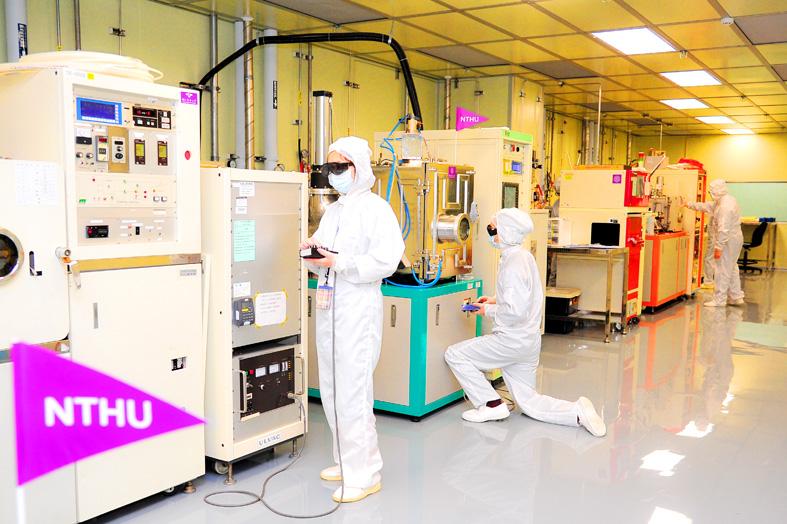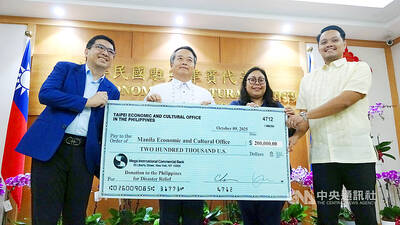National Tsing Hua University (NTHU) on Wednesday announced that it would team up with 10 of Taiwan’s largest tech firms to establish a semiconductor research college.
The college would be jointly operated with some of the larger companies in the sector, including Taiwan Semiconductor Manufacturing Co (TSMC) and Powerchip Semiconductor Manufacturing Corp, the university said.
Semiconductor development — such as design processes, the physics and chemistry of materials, components technology, IC design and advanced packaging — would be the college’s focus, it added.

Photo: Hung Mei-hsiu, Taipei Times
“We’ve invited Lin Burn-jeng (林本堅), who is well-known for developing an industry-changing immersion lithography technique, to act as dean of the college,” university president Hocheng Hong (賀陳弘) said.
Since 2016, Lin has been a distinguished research chair professor at the university. He worked for IBM in the US before returning to Taiwan to work for TSMC.
The companies would collectively invest more than NT$130 million (US$4.64 million) per year in the college, which would also receive funding from the government.
Other Taiwanese backers are GlobalWafers Co, Unimicron Technology Corp, United Microelectronics Corp, Vanguard International Semiconductor Corp, Novatek Microelectronics Co and Nanya Technology Corp, while Japan’s Tokyo Electron and the US’ Micron Technology are also onboard.
“We expect to accept 80 master’s students and 20 doctoral students each year into the college, and we will be offering a lot of scholarship money,” the university said. “We would like to begin accepting applicants as early as next spring.”
The university hopes that the college’s programs “will open students’ eyes” to the interdisciplinary nature of semiconductor development, which includes information technology, physics, chemistry, mechanical engineering, mathematics and other areas of study, Hocheng said.
Meanwhile, Lin said that the college would offer internationally competitive salaries to attract big-name teachers, including inviting industry elites to teach microcredit courses.
The college would also invite researchers from Academia Sinica and the US’ National Academy of Engineering, he added.

A drunk woman was sexually assaulted inside a crowded concourse of Taipei Railway Station on Thursday last week before a foreign tourist notified police, leading to calls for better education on bystander intervention and review of security infrastructure. The man, surnamed Chiu (邱), was taken into custody on charges of sexual assault, taking advantage of the woman’s condition and public indecency. Police discovered that Chiu was a fugitive with prior convictions for vehicle theft. He has been taken into custody and is to complete his unserved six-month sentence, police said. On Thursday last week, Chiu was seen wearing a white

The Taoyuan Flight Attendants’ Union yesterday vowed to protest at the EVA Air Marathon on Sunday next week should EVA Airway Corp’s management continue to ignore the union’s petition to change rules on employees’ leave of absence system, after a flight attendant reportedly died after working on a long-haul flight while ill. The case has generated public discussion over whether taking personal or sick leave should affect a worker’s performance review. Several union members yesterday protested at the Legislative Yuan, holding white flowers and placards, while shouting: “Life is priceless; requesting leave is not a crime.” “The union is scheduled to meet with

‘UNITED FRONT’ RHETORIC: China’s TAO also plans to hold weekly, instead of biweekly, news conferences because it wants to control the cross-strait discourse, an expert said China’s plan to expand its single-entry visa-on-arrival service to Taiwanese would be of limited interest to Taiwanese and is a feeble attempt by Chinese administrators to demonstrate that they are doing something, the Mainland Affairs Council said yesterday. China’s Taiwan Affairs Office (TAO) spokesman Chen Binhua (陳斌華) said the program aims to facilitate travel to China for Taiwanese compatriots, regardless of whether they are arriving via direct flights or are entering mainland China through Hong Kong, Macau or other countries, and they would be able to apply for a single-entry visa-on-arrival at all eligible entry points in China. The policy aims

The government yesterday donated US$200,000 to the Philippines to support post-earthquake relief and recovery efforts, following a powerful magnitude 6.9 quake that struck Cebu Province late last month, killing at least 72 people and injuring 559 others. The donation was presented earlier yesterday by Representative to the Philippines Wallace Chow (周民淦) to Cherbett Maralit, deputy resident representative of the Manila Economic and Cultural Office, at Taiwan’s representative office in Manila. In his remarks, Chow expressed concern for those affected by the magnitude 6.9 earthquake that struck the central Philippines on the night of Sept. 30. "We sincerely hope for the earliest possible